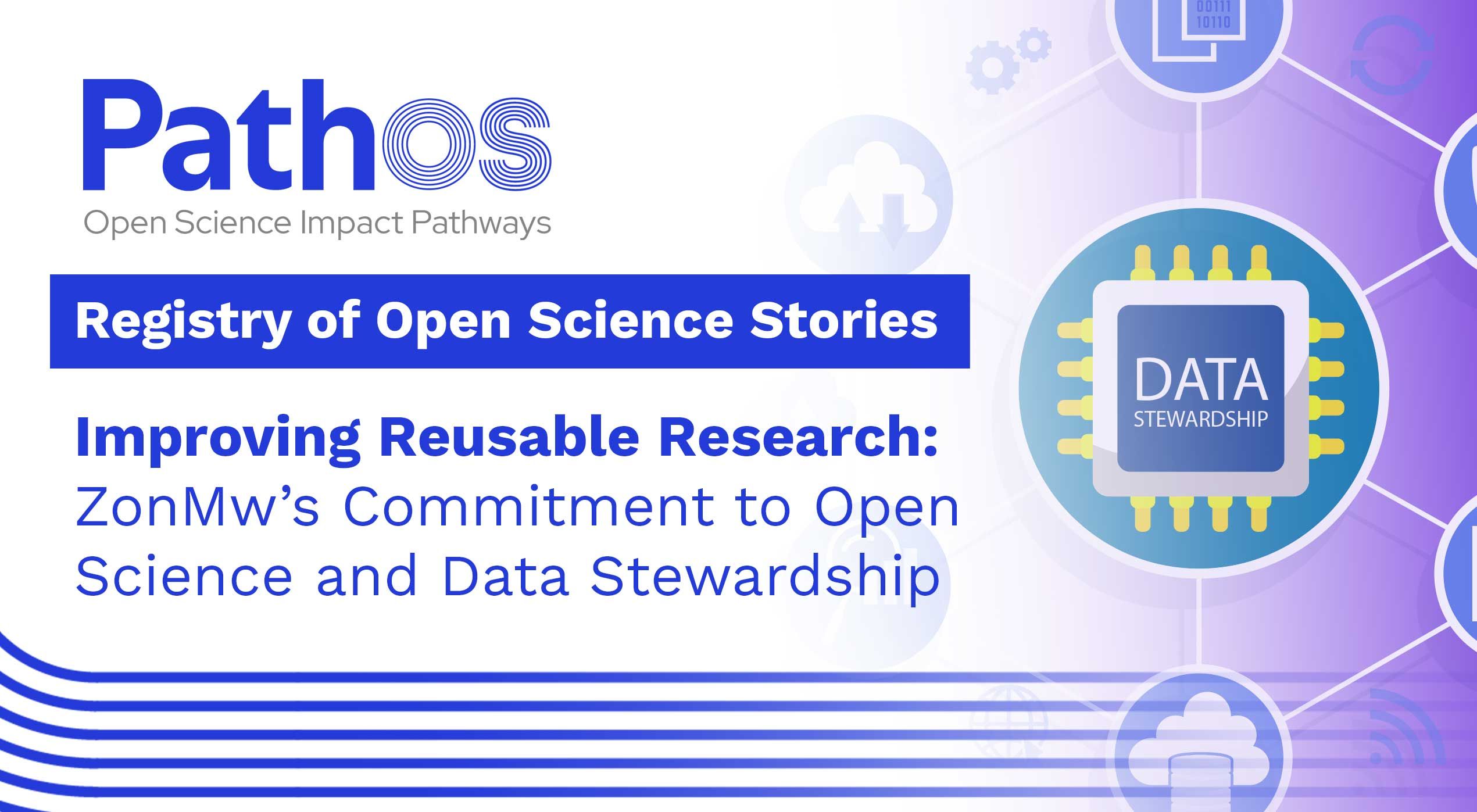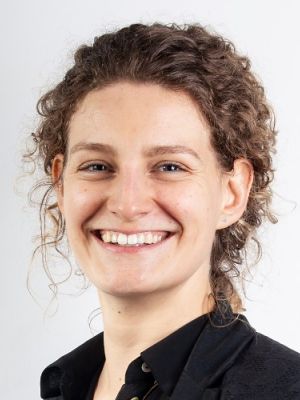Improving Reusable Research: ZonMw’s Commitment to Open Science and Data Stewardship

Within PathOS we are collecting stories on how Open Science (Open Access to publications, Open/FAIR data and software, collaborations with citizens) has made a positive or negative impact. Our ultimate aim is to highlight stories of Open Science practices and how these are linked to impactful outcomes. In this way, we hope to foster a learning experience and to inspire others to follow. Join us and read the first Open Science stories!
Could you briefly introduce yourself and what your Open Science story is about, including its time (e.g. year range) and location?
My name is Ellen Carbo, I did a bachelor’s in biology and a master’s in molecular neuroscience. I worked in that field for some time, but since 2016, I have been working as project leader in data related projects. I worked for a hospital, for different government organizations, and since 2022 I have been working at ZonMw. Here I am the project leader, and I am part of the Open Science team, where I specifically focus on reusable output out of grants, on topics such as data management, FAIR data, Open Access policies and Research Software.
ZonMw was founded 25 years ago. ZonMw programmes and funds research and innovation in health, healthcare and well-being, encourages the use of this knowledge and highlights knowledge needs. It receives most of its fundings from the Ministry of Health in the Netherlands and from NWO, the biggest research funder in the Netherlands. Besides our grant programs, we are also heavily involved in figuring out what kind of research is needed, to ensure the money for the grants are spend well.

"If we look at the big issues that the world is facing now, like climate change, the refugee crisis and its connection to health, there is so much more information in our existing data that could be of use."
What was the context or background in which this Open Science practice was used? What were the goals or expected outcomes?
Since its start, ZonMw requires that the results of research should be available for reuse. Over time, the policy has slowly become stricter and stricter; obviously, the idea behind it is that if research is already done, then we don't need to spend money on it again. Researchers ask for funding to collect data, while a lot of the data is already available. However, if it’s not findable, nor accessible, they have to collect the data again.
Nowadays, if as a researcher or as a project leader you have a question, it's very common to go into publications and see if this question has already been answered. If that is not the case, then, they will do their data collection to answer the question. The issue is that we're not taught to go into the deeper step which is checking whether the data to answer the question is already available. Funders, now, are really stimulating this broader approach. Often, though, a lot of that data is not actually findable or available. So, on the one hand ZonMw is telling researchers that if the data for them to answer the question is already available, they should get it. On the other hand, if data is not available yet, then they can get money for collecting the data, but then that data needs to be reusable by the next researcher.
What was your role or relationship to this Open Science practice? Were you a direct participant, an observer, or something else?
Our focus is currently on (FAIR) data and Open Access. FAIR data principles describe the best way to make data reusable and Open Access is currently the best route to make sure publications are reusable. So, FAIR data and Open access are strategies to get to the goal of reusable knowledge. A lot of the research that is done with funds made available by ZonMw, does not actually produce what people think of as “data”; data is not only numbers in a spreadsheet but also your recommendations, your lessons learned, your presentation, your poster at a conference; this is also information that comes out of your research. We are trying to say to researchers that, if they think it is important to share the results, they should try to make it Open Access and share them. The research was done with public money, and the method and results should be available to the public.
How was this Open Science practice implemented, to your knowledge? Who were the key actors involved?
For many years now, data management plans (DMPs) are mandatory for most funders and institutes. If you don't have a plan on how to manage your data, your data will likely never be reusable. In the past few years, we've taken it a step further and made it mandatory for projects that work with a lot of data to involve a data steward. Most institutes have data stewards nowadays, and if you don’t have one available, we try to help you where we can.
We don't have a FAIR data policy, we have a data policy: as a funder we’re not yet at the level where FAIR data is mandatory for all because it’s not yet possible for every researcher to create truly FAIR data. So, at the moment, we mostly focus on metadata: for every project you can at least register the title, name of project leader, how long the research ran for, what was done, a summary at the beginning, and a summary at the end. Even information like ‘what variables are in your dataset’, can already be shared without breaking any privacy rules. We're running a couple pilots on FAIR data, actually making the data itself FAIR, but that's not the general rule yet. Nationally and internationally, we are part of the movement to make FAIR data the norm, but that is a multi-year plan because it also needs to be possible and recognised among researchers.
Were there any quantifiable outcomes or measurable successes linked to this practice? What metrics or indicators were used to evaluate these outcomes, if any?
We don't have any statistics on data management yet, except for positive feedback that we've gotten from the scientific community. What we are observing is that there's more of a shift within the scientific community to want to become FAIR and to want to reuse data. We realized that the biggest trigger to make researchers aware of this is not to ask “how are you going to make your research reusable?”, but to ask “what other research do you want to reuse, and what is currently stopping you?”. It is much easier for people to state what others are doing wrong, then to be aware of what you could do better yourself.
What impacts, both expected and unexpected, did this practice have? Were there any surprising developments or results?
We get a lot of positive feedback from the scientific community that we've made the DMP mandatory. If you ask researchers if they want to make their data available to others, almost everyone says yes, but then they do not have time nor money to do that. Now, because we made it mandatory, they get time to do it from higher up, and they can reserve funding to do it.
Other positive feedback we receive is about data stewards. While before it was them running after researchers who had no time, now the researchers are running to the data stewards asking to review their DMPs. I think this helps for the development of the field, because you can't expect every researcher to have the knowledge of a data steward, it's a truly different role, with a different expertise. Researchers also appreciate help from data stewards on aspects like metadata, storage or licenses.
Besides setting requirements, we're also trying to stimulate the field with small grants. For instance, because there's wasn’t a Dutch portal to store metadata, we helped to get it started. This resulted in ‘Health RI’, which started two years ago and now receives 70m Euro from the Dutch government for over 7 years. Health-RI is the organization in the Netherlands dedicated to improving the reuse of health data for policy, research, and innovation to achieve a learning healthcare system. We're hoping that this health research infrastructure will be set up in such a way that all Dutch health research is findable, and FAIR, through that portal. So, through a small grant from ZonMw, it blossomed into something the government could pick up. And now that's growing into something which researchers, infrastructure, scientific groups in the Netherlands could use. It shows the collaboration between the parties, and it shows that ZonMw can both set the requirements and help create the right environment for reusable data.
What challenges were associated with this practice, from your perspective? What lessons can be drawn from its implementation?
There will always be naysayers for each new development, and these people are also present within Open Science. For instance, there's always going to be someone that thinks they don't need a DMP, who says “if others want to reuse my data, they just need to email me”. But other researchers don’t even know that data exists most of the time, so how would they know who to email? The same happens with Open Access, there's always going to be someone that doesn't think everything has to be Open Access because, if you don't have the right background, what are you going to do with that information? Luckily, more and more people are realising this logic is fallible and quite short-sighted.
How do you perceive this practice's influence on the wider scientific community or society? Has it affected your own views or approaches to research?
More researchers know what others are doing and we're really trying to stimulate that they collaborate. So, we're not arguing you should put your data on the Internet so that anyone can use it. We're saying that if you have information that other people could use to answer questions, work together, collaborate, they might have data which is really interesting for you. It's also about pushing researchers to connect: the fact that there are data stewards in institutes that don't know what research is currently being done within their own institute (!), shows the size of the challenge.
We've also realized that for some communities it's so unclear how to structure their data and what rules the data should follow that researchers would rather just collect it again. Which is why we say metadata is so important. If you can explain how you collected your data, then others might want to collaborate more.
If we look at the big issues that the world is facing now, like climate change, the refugee crisis and its connection to health, there is so much more information in our existing data that could be of use.
Based on your experience or observation, would you recommend this Open Science practice to others? Why or why not?
Yes. Because we try to set certain expectations, we can stimulate the field to improve. We've heard from different institutions that, because of the requirement set by funders in the Netherlands, they've hired data stewards. Before, the leadership would argue that there was no funding. Often, funders are seen as a place that sets requirements. But the perspective of the funder is that funding can also be driving force to stimulate Open Science.